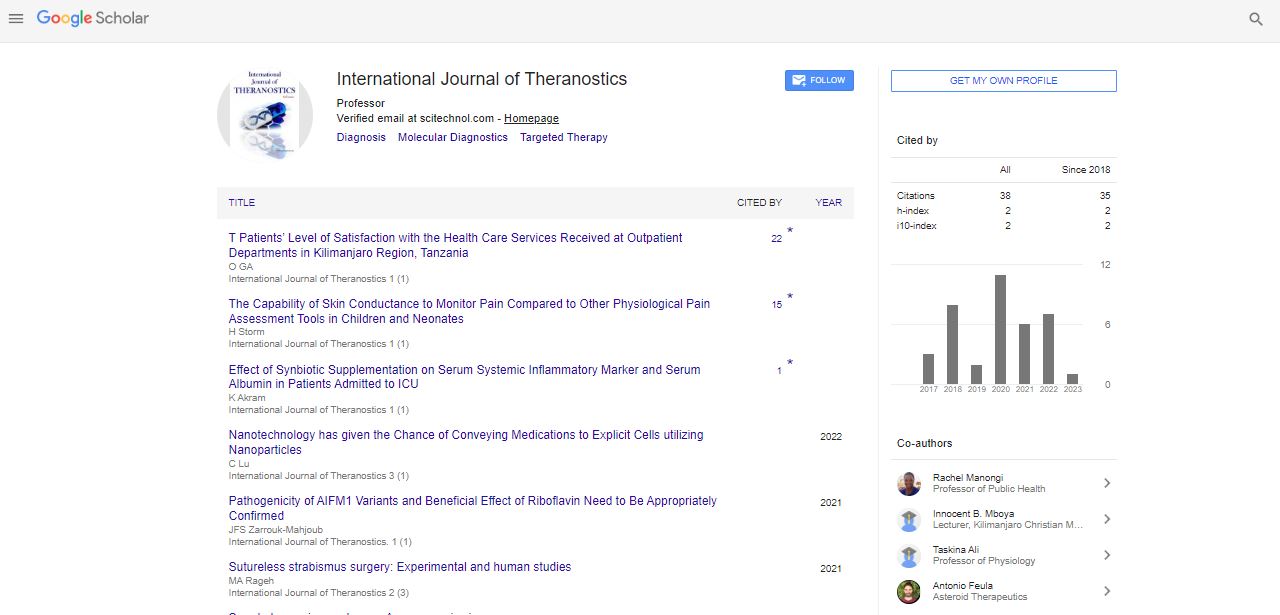Opinion Article, Int J Theranostic Vol: 12 Issue: 4
Personalized Medicine: Integrating Diagnostics and Therapeutics for Tailored Patient Care
Rahdar Sheik*
1Departamento de Química Analítica, La Paz University Hospital, Madrid, Spain
*Corresponding Author: Rahdar Sheik,
Departamento de Química Analítica, La
Paz University Hospital, Madrid, Spain
E-mail: Rahdarsheik58@qfioc.es
Received date: 27 November, 2023, Manuscript No. IJT-23-124052;
Editor assigned date: 29 November, 2023, PreQC No. IJT-23-124052 (PQ);
Reviewed date: 14 December, 2023, QC No. IJT-23-124052;
Revised date: 21 December, 2023, Manuscript No. IJT-23-124052 (R);
Published date: 28 December, 2023, DOI: 10.4172/IJT.1000142.
Citation: Sheik R (2023) Personalized Medicine: Integrating Diagnostics and Therapeutics for Tailored Patient Care. Int J Theranostic 12:5.
Description
Personalized medicine represents a paradigm shift in healthcare, moving away from the one-size-fits-all approach to a more tailored and individualized model of patient care. At the heart of personalized medicine is the integration of diagnostics and therapeutics, allowing for precise identification of patient-specific characteristics and the customization of treatment strategies. This essay explores the strategies and advancements in personalized medicine that seamlessly integrate diagnostics and therapeutics, offering a glimpse into the transformative potential of tailoring medical interventions to individual patient profiles.
Personalized medicine is grounded in the understanding that individuals differ not only in their genetic makeup but also in their lifestyle, environment, and unique responses to treatments. Advances in genomics, molecular biology, and bioinformatics have paved the way for a more comprehensive understanding of the factors influencing an individual's health and disease susceptibility.
Genomic profiling plays a central role in personalized medicine, allowing for the identification of genetic variations that may influence an individual's response to specific drugs or their predisposition to certain diseases. The completion of the Human Genome Project and subsequent advancements in sequencing technologies have made it feasible to analyze an individual's entire genome, enabling the identification of rare variants and informing personalized treatment decisions.
The integration of diagnostics and therapeutics in personalized medicine is a dynamic and iterative process. It begins with a thorough understanding of the patient's molecular and genetic profile, often obtained through advanced diagnostic techniques such as nextgeneration sequencing. This information serves as the foundation for tailoring treatment strategies that address the unique characteristics of the individual's disease.
Genomic profiling involves the comprehensive analysis of an individual's genetic material to identify mutations, variations, and alterations associated with disease. This information is crucial for predicting disease risk, selecting appropriate therapies, and determining the likelihood of treatment response. In cancer, for example, genomic profiling can guide the selection of targeted therapies that specifically address the genetic abnormalities driving the tumor's growth.
Beyond genomics, the identification of biomarkers-indicators of physiological or disease-related processes-plays a pivotal role in diagnostics and therapeutics. Biomarkers can be detected through various diagnostic modalities, including imaging techniques, blood tests, and molecular assays. For instance, the measurement of specific proteins in the blood can serve as biomarkers for certain diseases, aiding in both diagnosis and treatment monitoring.
Companion diagnostics are tests specifically designed to identify patients who are likely to benefit from a particular therapeutic intervention. These tests are developed in parallel with targeted therapies to ensure that the right patients receive the right treatment. An exemplary case is the use of companion diagnostics in oncology, where testing for specific genetic mutations helps determine whether a patient is eligible for a particular targeted therapy.
Pharmacogenomics explores how an individual's genetic makeup influences their response to drugs. By identifying genetic variations that impact drug metabolism, efficacy, and potential side effects, pharmacogenomic testing enables the selection of medications that are more likely to be effective and well-tolerated by a particular patient. This tailored approach minimizes the risk of adverse reactions and enhances treatment outcomes.
Personalized medicine has made significant strides in oncology, where the identification of specific genetic mutations and biomarkers has transformed treatment approaches. For example, the use of Epidermal Growth Factor Receptor (EGFR) inhibitors in Non-Small Cell Lung Cancer (NSCLC) is guided by the presence of EGFR mutations identified through molecular testing. This targeted therapy has demonstrated improved outcomes and reduced side effects compared to conventional chemotherapy.
In cardiovascular medicine, genetic testing can help identify individuals at risk of hereditary conditions such as familial hypercholesterolemia. Personalized treatment plans, including lifestyle modifications and pharmacotherapy, can then be tailored to address the underlying genetic predisposition, reducing the risk of cardiovascular events.
Conclusion
Personalized medicine is also making inroads in infectious diseases, particularly in the management of viral infections like HIV. Genotypic testing for drug resistance informs the selection of antiretroviral therapies tailored to an individual's viral susceptibility profile, optimizing treatment efficacy and minimizing the development of resistance.
While personalized medicine holds immense promise, several challenges must be addressed to realize its full potential. The integration of vast amounts of personal and genomic data raises concerns about patient privacy and data security. Safeguarding sensitive information is paramount to maintaining patient trust.
Ensuring equitable access to personalized medicine is a critical consideration. Disparities in healthcare access and resources must be addressed to prevent the exacerbation of existing inequalities. Efforts to make personalized medicine accessible to diverse populations are essential for its widespread and ethical implementation.
Successful implementation of personalized medicine requires collaboration among diverse stakeholders, including clinicians, geneticists, bioinformaticians, and regulatory bodies. Interdisciplinary cooperation is essential to navigate the complexities of genomic data interpretation, treatment decision-making, and ethical considerations.
Regulatory frameworks must evolve to accommodate the unique challenges posed by personalized medicine. Clear guidelines for the approval and regulation of companion diagnostics, genetic tests, and targeted therapies are necessary to ensure patient safety and treatment efficacy.
 Spanish
Spanish  Chinese
Chinese  Russian
Russian  German
German  French
French  Japanese
Japanese  Portuguese
Portuguese  Hindi
Hindi 